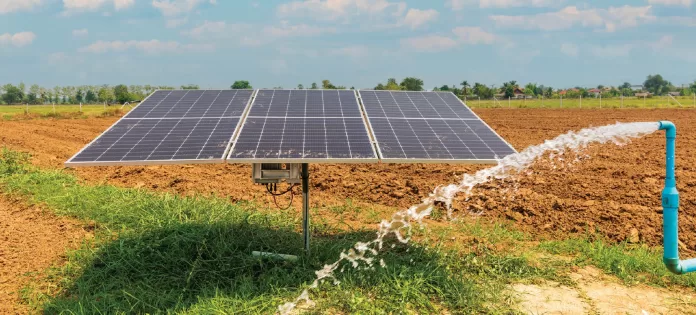Solar pumps are revolutionizing the way water is accessed and utilized, especially in remote and off-grid areas. These pumps, powered by photovoltaic (PV) panels, provide an eco-friendly and cost-effective alternative to traditional diesel or electric pumps. With the increasing global focus on renewable energy, solar-powered water pumps are emerging as a sustainable solution for agriculture, drinking water supply, and industrial applications.
How Solar Pumps Work
Solar water pumps operate by converting sunlight into electricity using solar panels. This electricity powers the pump, drawing water from sources such as wells, boreholes, rivers, or reservoirs. The system generally consists of solar panels, a pump controller, and the water pump itself. Depending on the requirement, solar pumps can be either submersible or surface pumps.
- Solar Panels: Capture sunlight and convert it into electrical energy.
- Controller: Regulates voltage and protects the pump from damage due to power fluctuations.
- Pump: Moves water from the source to the required location.
Types of Solar Pumps
Solar pumps come in various types, catering to different needs and applications:
1. Submersible Solar Pumps
- Used for deep water sources such as borewells and wells.
- Suitable for areas where groundwater levels are low.
- Ideal for agricultural irrigation and rural water supply.
2. Surface Solar Pumps
- Used for shallow water sources like lakes, rivers, and storage tanks.
- Efficient for small-scale irrigation and livestock watering.
- Easier to install and maintain than submersible pumps.
3. DC Solar Pumps
- Operate directly on solar power without needing an inverter.
- More energy-efficient and cost-effective.
- Ideal for remote areas with limited electricity access.
4. AC Solar Pumps
- Require an inverter to convert DC power from panels into AC power.
- Suitable for high-power applications.
- Used in large agricultural fields and industrial applications.
Advantages of Solar Pumps
- Cost-Effective: Solar pumps reduce electricity and fuel expenses, making them a long-term cost-saving investment.
- Eco-Friendly: They operate using clean, renewable solar energy, reducing carbon emissions.
- Low Maintenance: Solar pumps have fewer moving parts, resulting in lower maintenance costs and longer lifespan.
- Reliable in Remote Areas: They provide a dependable water supply in off-grid locations where traditional power sources are unavailable.
- Increased Agricultural Productivity: Farmers can efficiently irrigate their fields without dependency on erratic electricity supplies.
- Government Subsidies: Many governments offer incentives and subsidies to promote solar-powered water pumping systems.
Challenges of Solar Pumps
Despite their benefits, solar pumps also face some challenges:
- High Initial Cost: The upfront investment for solar panels and installation can be expensive.
- Weather Dependency: Performance may be affected by cloudy days and limited sunlight hours.
- Storage Limitations: Lack of battery backup may limit water pumping during nighttime or rainy seasons.
- Technical Knowledge: Users need basic technical understanding for maintenance and troubleshooting.
Applications of Solar Pumps
Solar pumps are used in various fields, including:
- Agriculture: Irrigation systems for crops and greenhouses.
- Drinking Water Supply: Providing clean water to rural and remote communities.
- Livestock Farming: Ensuring water availability for animals.
- Aquaculture: Maintaining water circulation in fish and shrimp farms.
- Industrial Use: Supplying water for industrial processes in off-grid areas.
Future of Solar Pumps
With rapid advancements in solar technology, the efficiency and affordability of solar pumps are improving. Innovations such as solar tracking systems, hybrid solar-diesel pumps, and better battery storage solutions are making solar pumps more reliable and practical. Governments and NGOs worldwide are promoting solar water pumping solutions to enhance rural livelihoods and combat climate change.
Conclusion
Solar water pumps offer an environmentally sustainable and economically viable alternative to traditional water pumping methods. Their ability to provide a consistent water supply without relying on electricity or fuel makes them a crucial asset for farmers, industries, and remote communities. As solar technology continues to advance, solar-powered water pumps will play an increasingly vital role in sustainable water management across the globe.














